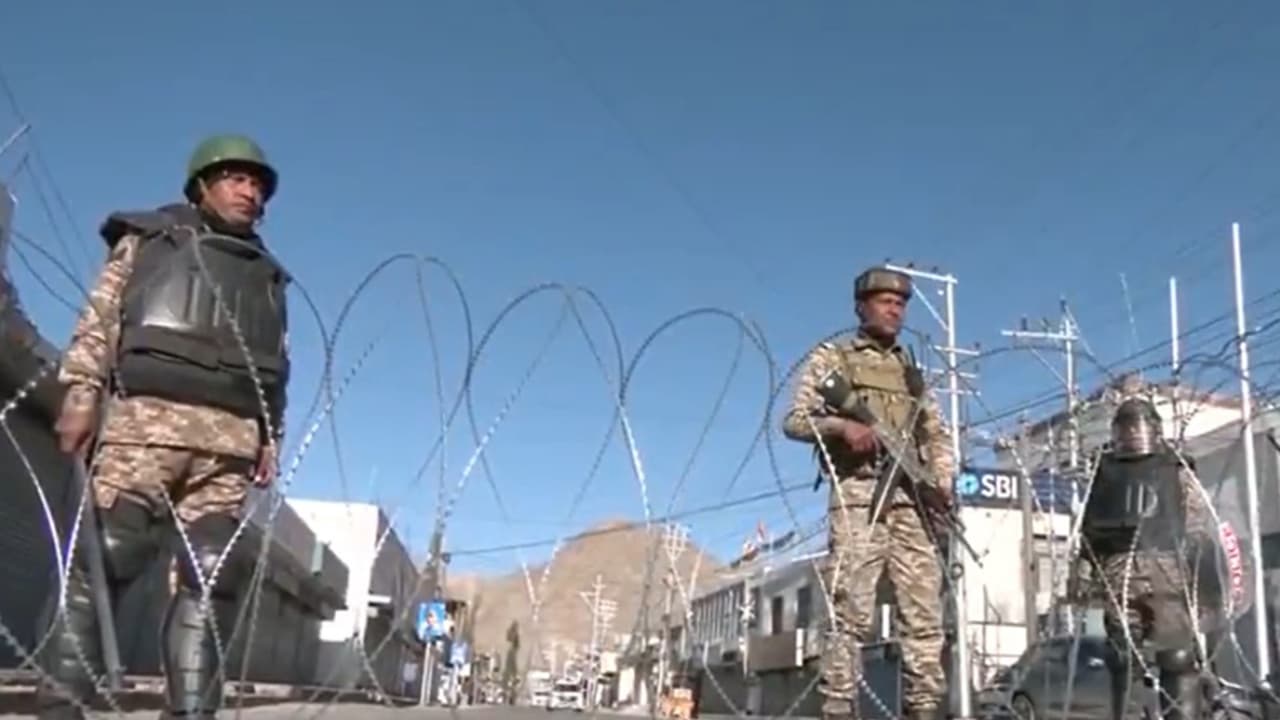Politics
Violence in Leh Sparks Ongoing Restrictions Under BNSS

Restrictions under Section 163 of the Bharatiya Nagarik Suraksha Sanhita (BNSS) continue in Leh following violent protests demanding statehood for Ladakh. As of Saturday, no gatherings of five or more people are permitted in the district, and any processions or rallies require prior written approval from authorities. Security personnel have been deployed throughout the area to maintain order.
On September 24, 2023, protests escalated in Leh, culminating in violence that resulted in the burning of a local office associated with the Bharatiya Janata Party (BJP). Tragically, four individuals lost their lives during the clashes. In the aftermath, climate activist Sonam Wangchuk was detained under the National Security Act (NSA) for allegedly “inciting violence.” Wangchuk’s family has confirmed his arrest, further intensifying reactions from various political factions.
Wangchuk’s Activism and Arrest
Wangchuk has been a vocal advocate for Ladakh’s inclusion in the Sixth Schedule of the Indian Constitution, which addresses the administration of tribal areas and promotes the establishment of autonomous district councils. His activism aims to secure greater autonomy and protection for the region’s unique cultural identity.
In a statement to ANI, Wangchuk expressed a willingness to face arrest, believing it could raise awareness about the issues at stake. “After violence, all the blame was put on Sonam Wangchuk. I also got information that a case under the Public Safety Act is being prepared against me, which would allow them to jail me for up to two years without trial or bail,” he said. He added, “I would be happy to be arrested anytime because it will make people more aware, rather than me being outside the jail. People will see that the man who brought pride to the country is in jail and will understand how the country is governed.”
Political Reactions
The arrest of Wangchuk has drawn sharp criticism from opposition parties. The Congress Party accused the BJP-led government of mishandling the situation in Ladakh, asserting that the response to the protests has been inadequate. Arvind Kejriwal, the national convenor of the Aam Aadmi Party (AAP), characterized the arrest as “dictatorship at its peak,” reflecting widespread concern regarding the government’s approach to dissent and civil liberties.
As the situation unfolds in Leh, the ongoing restrictions and political tensions are likely to remain at the forefront of discussions surrounding governance, regional autonomy, and the rights of citizens in the context of statehood for Ladakh. The developments in this region are being closely monitored, both locally and nationally.
-

 World5 months ago
World5 months agoSBI Announces QIP Floor Price at ₹811.05 Per Share
-

 Lifestyle5 months ago
Lifestyle5 months agoCept Unveils ₹3.1 Crore Urban Mobility Plan for Sustainable Growth
-

 Science4 months ago
Science4 months agoNew Blood Group Discovered in South Indian Woman at Rotary Centre
-

 World5 months ago
World5 months agoTorrential Rains Cause Flash Flooding in New York and New Jersey
-

 Top Stories5 months ago
Top Stories5 months agoKonkani Cultural Organisation to Host Pearl Jubilee in Abu Dhabi
-

 Sports4 months ago
Sports4 months agoBroad Advocates for Bowling Change Ahead of Final Test Against India
-

 Science5 months ago
Science5 months agoNothing Headphone 1 Review: A Bold Contender in Audio Design
-

 Top Stories5 months ago
Top Stories5 months agoAir India Crash Investigation Highlights Boeing Fuel Switch Concerns
-

 Business5 months ago
Business5 months agoIndian Stock Market Rebounds: Sensex and Nifty Rise After Four-Day Decline
-

 Sports4 months ago
Sports4 months agoCristian Totti Retires at 19: Pressure of Fame Takes Toll
-

 Politics5 months ago
Politics5 months agoAbandoned Doberman Finds New Home After Journey to Prague
-

 Top Stories5 months ago
Top Stories5 months agoPatna Bank Manager Abhishek Varun Found Dead in Well









